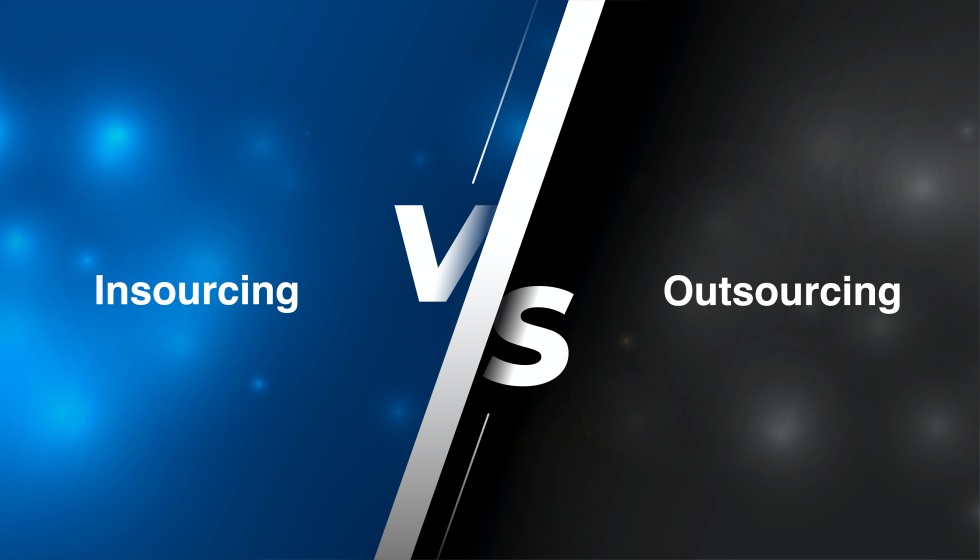In the ever-evolving business world, the decision between insourcing and outsourcing has become a pivotal factor for companies seeking to optimize their operations. Insourcing involves keeping business functions in-house, and utilizing internal resources and expertise, while outsourcing entails delegating specific tasks or processes to external vendors or partners. Both approaches offer unique advantages and challenges, making it crucial for businesses to carefully evaluate their options. This article will explore the key considerations, benefits, and drawbacks of insourcing and outsourcing, helping you decide what’s best for your business.
What is Insourcing?
Insourcing refers to keeping business functions and processes within an organization, utilizing internal resources, infrastructure, and expertise to fulfill operational requirements. It involves relying on the skills and capabilities of in-house employees to perform various tasks and responsibilities. Insourcing allows companies to control their operations directly, enabling better coordination, communication, and alignment with organizational goals.
Pros of Insourcing
Here are some benefits that insourcing offers.
Direct Control Over Operations
Insourcing grants businesses direct control over their operations, enabling them to swiftly make decisions and implement changes. With in-house management, companies have the flexibility to adapt to market demands, and customer needs effectively. This control also fosters seamless coordination between departments, promoting a cohesive workflow. Organizations can optimize processes and enhance operational efficiency by aligning strategies and goals more closely.
Better Coordination and Communication Within the Organization
Insourcing improves coordination and communication within an organization’s operational infrastructure, fostering a collaborative work environment. It facilitates the efficient sharing of resources, knowledge, and expertise among teams. Effective coordination streamlines processes, eliminates duplication of efforts and enhances overall operational efficiency. Employees can exchange information faster with direct communication channels, leading to fewer misunderstandings and improved decision-making. This fosters a positive work culture, boosting employee engagement, productivity, and loyalty.
Tailored Processes to Meet Specific Needs
Insourcing allows businesses to tailor their processes to meet specific needs. Companies can customize their operations by keeping functions in-house according to their unique requirements. This customization ensures that processes are aligned with the organization’s goals, industry standards, and customer expectations. Insourcing enables businesses to implement specialized workflows, adopt industry-specific practices, and integrate internal systems seamlessly. Organizations can optimize efficiency, reduce waste, and enhance productivity with tailored business processes. Moreover, customization allows for incorporating feedback and continuous improvement, resulting in streamlined operations that are finely tuned to address specific challenges and deliver exceptional results.
Higher Quality Control and Accountability
Insourcing offers higher quality control and accountability to businesses. By keeping operations in-house, organizations have direct oversight and can maintain stringent quality standards. They can implement quality control measures, ensure compliance with regulations, and uphold the brand reputation. With in-house control, businesses can closely monitor each process step, promptly identify and address any quality issues, and take immediate corrective actions. This commitment to quality control and accountability contributes to delivering products or services that meet or exceed customer expectations, enhancing customer satisfaction and loyalty.
Fosters a Sense of Ownership and Loyalty Among Employees
Insourcing fosters a strong sense of ownership and loyalty among employees. Employees are directly involved in the company’s success when business functions are kept in-house. They take pride in their contributions and feel a sense of ownership. Insourcing lets employees see their efforts’ direct impact, boosting motivation and engagement. It also creates a supportive work culture where employees feel valued and recognized for their contributions. As a result, they develop a deep sense of loyalty toward the organization, leading to lower turnover rates and higher employee retention. This loyalty translates into increased productivity, as employees are more committed to achieving the company’s goals and objectives.
Are you facing the dilemma of insourcing or outsourcing certain tasks?
Contact Growth Hackers
Cons of Insourcing
After the pros, now let’s discuss some cons of Insourcing.
Increased Operational Costs
Insourcing can lead to higher operational costs for businesses. Keeping functions in-house often requires additional infrastructure, technology, equipment, and employee training investments. Organizations may also need to hire and maintain a larger workforce, resulting in increased payroll and overhead expenses. These added costs can strain the company’s financial resources, especially for small or resource-constrained businesses.
Limited Access to Specialized Expertise
Insourcing may limit a company’s access to specialized expertise or niche skills that external service providers can offer. While internal employees may possess general knowledge and skills, they may not have the same level of specialization or depth of experience, or particular focus as external professionals. This limitation can impact the company’s ability to innovate, adapt to changing market trends, or efficiently handle complex tasks or projects.
Reduced Scalability and Flexibility
Insourcing can pose challenges in terms of scalability and flexibility. When business functions are kept in-house, organizations may face constraints in quickly scaling their operations to meet increased demands or downsizing during periods of low activity. Additionally, in-house teams’ existing employees may struggle to adjust to fluctuating market conditions or rapidly evolving technologies, which could hinder the company’s ability to stay competitive and agile.
Increased Administrative Burden
Insourcing often requires businesses to handle various administrative tasks associated with managing and supporting an in-house team. This includes recruitment, onboarding, training, performance evaluations, payroll management, and employee benefits administration. The increased administrative burden can divert valuable time and resources from core business activities and strategic initiatives.
What is Outsourcing?
Outsourcing is a business practice where companies delegate specific tasks, processes, or functions to external vendors or service providers. Rather than handling these activities in-house, organizations rely on external entities’ expertise and resources. Outsourcing can encompass various areas such as IT services, customer support, manufacturing, or marketing.
Pros of Outsourcing
Outsourcing provides several benefits, some of which are given below.
Cost Savings
Outsourcing offers businesses the opportunity to achieve significant cost savings. By delegating specific tasks or processes to external service providers, organizations can avoid the expenses associated with hiring and training additional staff, purchasing specialized equipment, and maintaining infrastructure. External vendors often operate at a lower cost due to economies of scale, efficiency, and expertise in their respective fields. They can leverage their resources and experience to provide services more cost-effectively than in-house operations. Furthermore, outsourcing eliminates the need for long-term investments and commitments, allowing businesses to access services flexibly, as needed. The cost savings achieved through outsourcing can be redirected to core business activities, innovation, or expansion efforts, enhancing overall profitability and competitiveness.
Access to Specialized Expertise
Outsourcing enables businesses to tap into a global talent pool of specialized expertise and knowledge that may not be available internally. External service providers are typically industry experts with extensive experience and skills in their specific domains. They keep up with the latest industry trends, technologies, and best practices, allowing businesses to benefit from their up-to-date knowledge and insights. Outsourcing also provides access to a diverse talent pool, as businesses can choose from various service providers with different areas of expertise. This access to specialized expertise empowers organizations to leverage the capabilities of external professionals and gain a competitive edge. Whether IT services, marketing, accounting, or customer support, outsourcing allows businesses to leverage the expertise of professionals who excel in those areas.
Increased Focus on Core Activities
By outsourcing software development or other non-core tasks, businesses can free up valuable time and resources, allowing them to focus on their core activities rather than dealing with their intricacies. Core activities are the strategic functions and operations that directly contribute to the organization’s mission and value proposition. Outsourcing tasks enables internal teams to redirect their attention to activities that drive innovation, customer satisfaction, and revenue generation. This increased focus on core activities can improve efficiency, productivity, and business growth. It also allows organizations to allocate resources strategically, ensuring that the most critical tasks receive the necessary attention and expertise, whether it is to outsource software development or any marketing related tasks.
Enhanced Flexibility and Scalability
Outsourcing provides businesses greater flexibility and scalability, allowing them to adapt to changing market dynamics and demands. External service providers are often equipped to handle fluctuating workloads, seasonal peaks, or sudden expansions. They can quickly scale their operations up or down as per the business’s requirements without businesses having to invest in additional resources or worry about capacity limitations. Outsourcing also offers flexibility in terms of contract durations and service-level agreements. Businesses can engage service providers on a short-term or long-term basis, depending on their needs and goals. This flexibility allows organizations to respond swiftly to market changes, seize opportunities, and optimize resource allocation.
Risk Mitigation
Outsourcing can help businesses mitigate certain risks associated with specific functions or operations. External service providers assume responsibility for managing and mitigating risks within their areas of expertise. They often have established protocols, security measures, and industry-specific knowledge to effectively handle potential risks and challenges. For instance, IT outsourcing providers may have robust cybersecurity measures to protect sensitive data, reducing the risk of security breaches. Similarly, outsourcing compliance-related functions to professionals well-versed in regulatory requirements can ensure adherence to legal frameworks and minimize compliance risks. By relying on the expertise of external service providers, businesses can benefit from their risk management practices and avoid potential pitfalls.
Cons of Outsourcing
Along with the benefits, there are some disadvantages that outsourcing offers.
Loss of Control
One of the significant drawbacks of outsourcing is the potential loss of control over the outsourced functions. Businesses may have limited control and decision-making authority over outsourced processes and activities when relying on external service providers. This can result in reduced oversight and may impact the ability to align operations with the organization’s goals and standards.
Let’s help you make the right choice. Act today and seize the advantages of insourcing or outsourcing!
Communication and Coordination Challenges
Outsourcing often involves collaboration with external vendors or offshore teams, which can lead to communication and coordination challenges. Differences in time zones, language barriers, and cultural nuances may hinder effective communication and information exchange. Miscommunication or delays in addressing queries or concerns can impact productivity, lead to misunderstandings, and cause project delays.
Quality Control Concerns
Outsourcing can introduce potential quality control issues. Businesses may face challenges ensuring that the outsourced team, tasks, or deliverables meet their desired quality standards. Without direct supervision and oversight, there may be a risk of subpar work or a mismatch between expectations and outcomes. This can negatively impact customer satisfaction, brand reputation, and overall business performance.
Security and Confidentiality Risks
Outsourcing involves sharing sensitive information, data, and intellectual property with external entities. This poses security and confidentiality risks, particularly if the service provider does not have robust data protection measures. Breaches in data security or mishandling of confidential information can lead to financial losses, reputational damage, and legal implications for the business.
Dependency on External Providers
Outsourcing certain functions can result in dependency on external service providers. Businesses may become reliant on the expertise and resources of these vendors, making it challenging to bring the functions back in-house or switch to a different provider if needed. This dependency can reduce flexibility and limit the organization’s ability to respond quickly to changing market conditions or business needs.
Insourcing Vs Outsourcing: Factors to Consider
Several factors come into play when considering whether to choose insourcing or an outsourcing partner for a particular business function or process. Here are some important factors to consider when making this decision.
Cost considerations
Cost is often one of the primary factors influencing the decision between insourcing and using outsourcing services. Insourcing involves hiring and managing an in-house team to perform the task, which may include expenses such as salaries, benefits, infrastructure, and training costs. On the other hand, outsourcing allows businesses to leverage external service providers who may offer cost-effective solutions due to economies of scale or lower labor costs in different regions. Analyzing the overall financial impact of both options is crucial.
Core competency
Evaluating your organization’s core competencies is essential when deciding whether to insource or outsource. Core competencies are the unique strengths and capabilities that give your company a competitive advantage. It may be beneficial to insource activities closely aligned with your core competencies, as they can be a source of differentiation and expertise. Conversely, non-core activities that do not provide a competitive edge may be better outsourced to external specialists, allowing your business to focus on its core functions.
Flexibility
The need for flexibility and scalability is another significant factor to consider. Insourcing provides greater control and flexibility over the processes, enabling rapid adjustments and customization according to business needs. On the other hand, outsourcing can offer scalability advantages, as external providers often have the resources and expertise to handle fluctuating workloads more efficiently. An outsourcing provider may provide flexibility if your business experiences varying demands or requires specialized skills intermittently.
Risk Management
Risk management plays a vital role in the decision-making process. Insourcing provides better control over data security, intellectual property, and sensitive information, as the processes remain within the organization’s boundaries. However, it also means assuming all associated risks, including infrastructure failures, employee turnover, and regulatory compliance. Conversely, outsourcing transfers certain risks to the external service provider, such as legal compliance, operational disruptions, or technology failures. Assessing the function’s criticality and risk tolerance level is crucial.
Strategic Alignment
The alignment of the insourced or outsourced function with your organization’s strategic objectives is an essential consideration. Insourcing may be preferred when a function is critical to your core business strategy and requires tight integration with other operations. It allows for better control, coordination, and seamless collaboration. However, suppose the function is not a strategic priority and can be effectively performed by specialized external providers. In that case, outsourcing can provide access to specialized knowledge and resources, enabling your organization to focus on core strategic initiatives.
Final Words on Insourcing Vs Outsourcing
The debate surrounding insourcing vs outsourcing remains hot in today’s business landscape. While insourcing provides control, flexibility, and potential cost savings, outsourcing offers access to specialized expertise, reduced operational burden, and enhanced scalability. Both approaches have their merits, and the choice ultimately depends on each organization’s unique needs and goals. It’s crucial to carefully evaluate the budget, industry dynamics, core competencies, and long-term objectives. A hybrid model that combines the best of both worlds may also be a viable solution. Ultimately, organizations must strive for a balanced approach that maximizes efficiency, innovation, and overall business success.
Growth Hackers is an award-winning international marketing company helping businesses from all over the world grow. There is no fluff with Growth Hackers. We help entrepreneurs and business owners explore the possibilities of outsourcing, increase their productivity, generate qualified leads, optimize their conversion rate, gather and analyze data analytics, acquire and retain users and increase sales. We go further than brand awareness and exposure. We make sure that the strategies we implement move the needle so your business grow, strive and succeed. If you too want your business to reach new heights, contact Growth Hackers today so we can discuss about your brand and create a custom growth plan for you. You’re just one click away to skyrocket your business.










